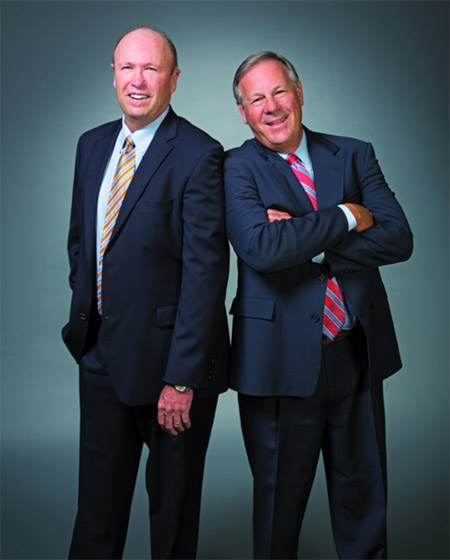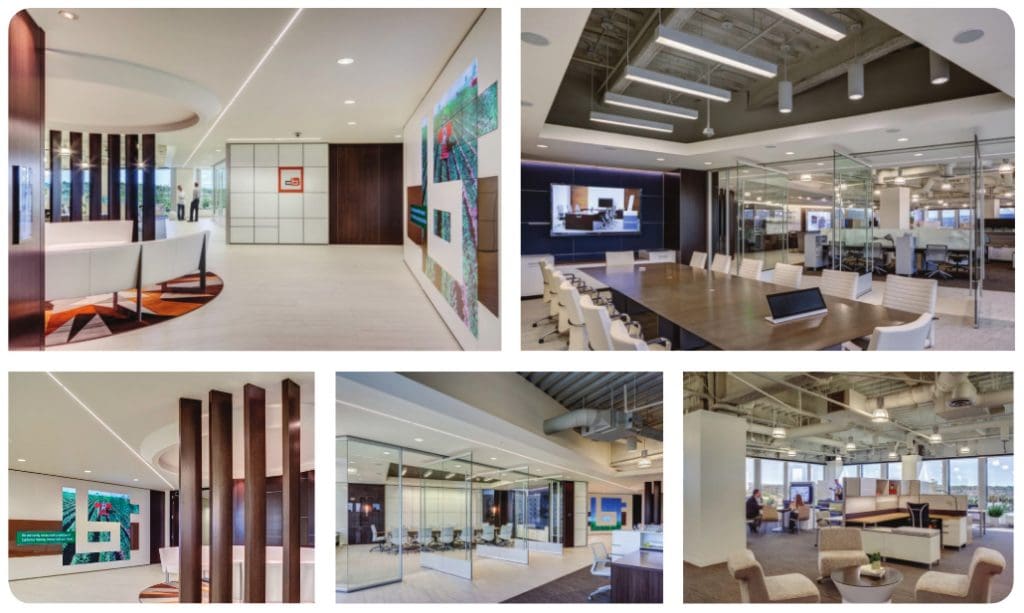You’ve probably never heard of Presentation Products, Inc., but it’s a company with more than a 30-year history of installing and integrating some of the most progressive AV systems in the industry — and of treating its employees well. Presentation Products, Inc. is better known as Spinitar, a name that came about when principal and founder Jeff Irvin couldn’t get the URL for his original name at a critical juncture for the business and he asked an ad agency for help.
“We were founded as Presentation Products, Inc., in May of 1986,” he explains. “As we were transitioning the company from technology provider to integrator in the late 1990s, we felt like the name didn’t lend itself to that migration. Presentation Products, while being a very descriptive name, kind of pigeon-holed us as a box house. Also, we didn’t own the URL www.presentationproducts.com. One call to the owner of that URL told me it was going to be a lot less expensive to just change our name than to try to purchase it.
“So we hired an ad agency, told them that we were looking for a name that had energy, one that we could easily build a brand around. It didn’t have to be a name in the English dictionary, but it did have to be one that we could own the dot com, dot org, and dot net. They proposed the name ‘Spinitar’ first, which we weren’t quite sure about. Once they paired the name with the new logo, we were sold.”
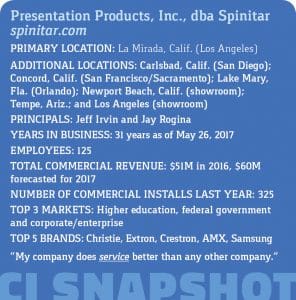 That decision was among the few complicated aspects for a company that prides itself on simplicity. In fact, Spinitar’s tagline is “Services. Simplified. Since 1986.” (More on that later.) It’s an approach that’s spun Spinitar into a $60 million integration firm that’s engendered loyalty from its growing number of employees and manufacturer partners — and even its competitors.
That decision was among the few complicated aspects for a company that prides itself on simplicity. In fact, Spinitar’s tagline is “Services. Simplified. Since 1986.” (More on that later.) It’s an approach that’s spun Spinitar into a $60 million integration firm that’s engendered loyalty from its growing number of employees and manufacturer partners — and even its competitors.
Focused on Services
“While we very much value the technology we integrate and our relationships with our manufacturers that provide it, we also realized some time ago that our services offering and how we deliver it will be the true differentiator,” says Irvin. “We knew we needed to identify the ‘VA’ in VAR [value-added reseller].”
Irvin says that the company decided to flip the conversation with the customer — leading with services and treating the product/technology discussion with lessor importance. The change in philosophy has paid off handsomely.
“Today, our maintenance agreement/managed services business is booming, creating a real stickiness with our customers,” Irvin says. “We try to lead with services — that’s the differentiator for us. We’re trying to take the focus off the technology.”
How It Started
Irvin worked at KROY, a lettering and labeling system manufacturer, for about five years, finishing as western division sales manager when company officials decided to sell or close its U.S. sales offices and sell through independent dealers.
Irvin and his wife, Barbara, bought the business on May 26, 1986. “We initially bundled AV gear [overhead projectors, easels, carts, pointing devices, etc.] around the lettering system offering,” says Irvin. “We were one of the early adopters of selling LCD panels when they entered the market, and that fueled our growth in the direction of AV.”
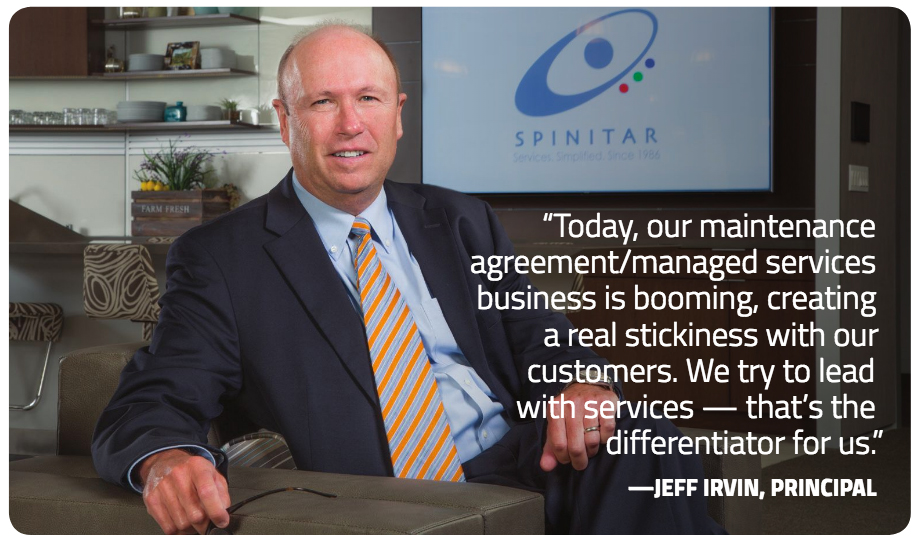 Spinitar was primarily a product sales company until the late 1990s when Jay Rogina joined as a fellow principal. At that time, the company had nearly 40 employees and $20 million in annual revenues. Today, the staff is around 130 and revenues are projected to be $60 million this year.
Spinitar was primarily a product sales company until the late 1990s when Jay Rogina joined as a fellow principal. At that time, the company had nearly 40 employees and $20 million in annual revenues. Today, the staff is around 130 and revenues are projected to be $60 million this year.
“While I was a sales and marketing guy selling projectors, Jay brought the services knowledge that we so desperately needed,” says Irvin. “It was his charge to migrate us from a provider of technology to an integrator of technology. Without this migration, we simply would not be here talking to you today.”
Shift in Organizational Structure
Irvin explains that Spinitar began the integration practice with the traditional approach of sales going out and selling its products and services, then leaving it to the implementation team to figure how to build the system. Things didn’t go smoothly, creating “a good deal of infighting, finger-pointing and lackluster business performance for several years,” he admits.
“About five years ago, we leveraged the well-known concept of self-directed work teams, pairing sales with design and project management staff. Now, the team is involved in designing, proposing and building, ultimately all taking responsibility for our customers’ success. While this concept is not prevalent throughout our industry, this has been a ‘sea change’ for our company and most importantly for our customers,” Irvin says.
Before this massive overhaul in 2012, “the silos didn’t communicate with each other,” says Irvin.
“People were spending far too much time trying to find the information they needed. We couldn’t analyze a project and find out if we made money on it,” he says.
Today, sales and operations “are together as a team,” says Rogina. “They’re business units. Everyone’s accountable. They know what they need to do.”
At the same time, Spinitar developed new hiring practices that “made people accountable to themselves,” says Rogina, by using a peer-driven model that puts candidates through interviews with five or six people in various areas of the company with various philosophies and expertise.
“Everyone is looking for something different and that helps us find people who should be good fits if we do hire them,” says Rogina. “It gives them an idea if they want to work for us too. You can’t train personality and culture, but you can train technical skills.
“We’re slow to hire and quick to fire. We’ve lost some good people because of the way we do it, but we think it’s the right approach,” he adds. “We have self-directed teams who share in the bottom-line success. Sales helps design, design helps the project manager. Everyone takes ownership.”
Spinitar saw top-line growth of 76 percent from 2015 to 2016, says Irvin, so their approach has made a positive impact.
“We’re not just trying to put a warm body in a seat,” he says.
‘Unique’ Company Culture
Irvin describes the culture at Spinitar as “quite unique” and it’s hard to argue with that. Companies leaders celebrate employees’ birthdays and anniversaries, host quarterly breakfasts for all employees, present watches to those who reach the five-year mark, give cruises to those who make it their 10th anniversary with Spinitar, give a personalized gift to employees who reach 15 years with the company and send employees who hit 20 years with the company to a Hawaiian resort all expenses paid.
Recently, Irvin and Rogina took more than 120 Chairman’s Club members to LeBlanc Resort in Cancun to celebrate their successes in working with and for Spinitar. It’s the 12th year they’ve taken such trips.
We believed that if we made the employee experience more enjoyable and rewarding, that it would then rub off on the customer experience. Jeff Irvin
“Culture’s really important, but we also like creating memories,” says Rogina. “Bonuses don’t do that. That just pays a bill.”
Irvin and Rogina also host partner appreciation events twice a year. “We know how to throw a party,” says Irvin.
But loyalty can be fleeting, as Rogina heard from behavioral scientist James Kane at the 2017 NSCA Business & Leadership Conference.
“That gave me a whole new perspective,” says Rogina. “I’m not sure if our customers are loyal to us or to the salesperson.”
Irvin says that means it’s even more important for Spinitar to set itself apart from the crowd. “We need to be knowledge brokers and a resource for our customers,” he says.
[inpagepromo]
Staying on Top
Spinitar has become well-known as one of the most willing companies to work on projects with its competitors, perhaps a nod to its membership in PSNI and NSCA, among other industry associations.
While it may be scary for some companies to partner with those whom they compete for work, there’s no such fear with Spinitar, says Rogina.
“We’re not out to take someone else’s business,” he says.
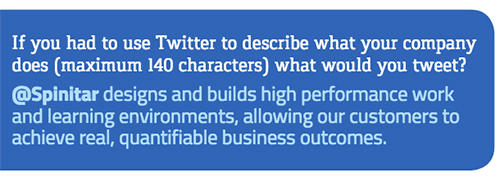 That’s not the only way Spinitar is expanding its reach into new markets and new geographies. There’s much more work to be done, according to Irvin.
That’s not the only way Spinitar is expanding its reach into new markets and new geographies. There’s much more work to be done, according to Irvin.
“We need to continue to find new ways to remain relevant,” he says. “We need to address mobilization and the virtual workforce, as it’s no longer just about boardrooms, conference rooms, training rooms and classrooms. We need to identify and leverage soft solutions that will help our customers experience success.
“We need to expand our services offering beyond traditional and begin to offer other services like RMS, training, managed services and more. We need to evolve our salespeople to become much more consultative with our customers, going deeper and wider within their respective organizations and institutions and have them become trusted advisors. We need to continue to find ways to utilize LEAN practices and principles to rip out redundancy, waste, and inefficiencies. While I believe we’re good, we must work every day to get better — easier said than done in a world that keeps spinning and changing!”
Irvin notes that securing recurring revenue is very important to Spinitar. He explains that maintenance agreements are
presented on every proposal the company does and it attaches maintenance to about 70 percent of projects, with a renewal rate in excess of 90 percent.
In 2016, about $48 million of Spinitar’s $51 million in sales had a service element attached.
We have self-directed teams who share in the bottom-line success. Sales helps design, design helps the project manager. Everyone takes ownership. Jay Rogina
Spinitar also has dedicated service account managers who focus on the renewal from day one of selling the initial maintenance agreement “by assuring and encouraging customer satisfaction and adoption of the system we’ve built, assure ‘up’ time, minimize ‘down’ time, expand the relationship with the customer, so that the renewal of the support agreement is a natural occurrence,” says Irvin.“I think we do that better than most in this industry,” says Irvin.
The company recently opened a showroom in downtown Los Angeles and an office in Tempe, Ariz., and is exploring the viability of a remote monitoring AV network operations center as it continues its growth.
“We hit $50 million and now it’s time to go for $100 million,” says Rogina. “How will we get there?”
One area gaining momentum for the company is the government sector. With two federal government teams, top-secret clearances and a strong GSA contract in place, Spinitar now finds itself doing work all over the world for various government agencies. They have done work in Vietnam, Ireland, Belize and many other foreign outposts, largely working in U.S. consulates, embassies and courtrooms.
Importance of Lifelong Learning
“Continuing education and training is paramount at Spinitar,” says Irvin. “We pay for the training and then appropriately compensate and reward those who have achieved both industry and manufacturer certifications. Without a qualified workforce in place to support our customer, we’re simply just another AV company.”
Spinitar was one of the early companies to achieve the InfoComm AV Provider of Excellence [APEx] certification, a point of pride for all involved.
“We feel that our commitment to training is a differentiator, and that we must leverage this with prospective and existing customer, as it will hopefully get them to think beyond price and consider overall value,” says Irvin.
Spinitar’s tagline under its logo and name is ‘Services. Simplified. Since 1986.’ ‘Services’ speaks to the company’s services-first approach, leading and leveraging with the ongoing world-class support of any and every room they build. ‘Simplified’ speaks to Spinitar’s investment in infrastructure (ERP), self-directed work teams and a strong adherence and discipline to processes, ultimately simplifying both the employee and customer experience. Finally, the ‘Since 1986’ speaks to the company’s staying power in a technology industry where there have been many casualties.
“I believe that there is trust in companies who have longevity and that trust is a true driver in business decisions,” says Irvin. “I believe customers have and will continue to choose Spinitar because of that trust. So the message is lead with services, continually work to simplify which by nature is a very complex business, and you too can experience longevity in this ever-changing world.”
Enabling Employees to Fuel Future
“Like many companies, we were forced to reduce staff and operating expenses as business opportunities contracted [during the recession about a decade ago],” says Irvin. “While it was certainly a tough time, I believe we learned some valuable lessons during that period and I believe those lessons are as relevant today as we experience a very robust economy.”
At that time, Irvin and Rogina made a major shift and began to focus on “the employee experience.”
Culture’s really important, but we also like creating memories. Bonuses don’t do that. That just pays a bill. Jay Rogina, Spinitar
“We believed that if we made the employee experience more enjoyable and rewarding, that it would then rub off on the customer experience,” says Irvin. “So, during the recession we actually invested in tools and systems that would improve our employees’ ability to get work more efficiently and give them true access to the information they needed.
“This ERP investment was risky to take on during this period, but we knew that we had to become more efficient and have a platform from which our employees had a better opportunity to succeed. This is simply the most important investment we’ve made in our 30-plus years of business.”
After what Irvin calls “extraordinary growth” in 2016, Spinitar entered 2017 with “a very large backlog of business, some of which will take us all over the globe,” he says.
“The remoteness of some of this work adds a whole level of complexity, while we still continue to try to get our hands on qualified talent to design and build these spaces for our customers,” says Irvin. “Having two dedicated federal government teams with a focus on facilitating this work will be key. Without this focus, I’m not sure we could pull it off.”


